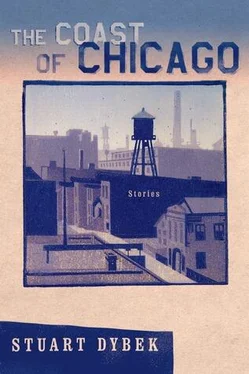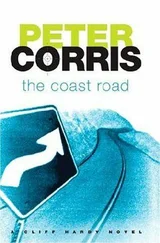The Art Institute, by contrast, seemed flooded with light — not merely the light streaming from skylights or the track lights focused on paintings. The paintings themselves appeared to throw an internal light the way that oaks and maples seem aflame in fall, from the inside out. My favorite painters were the Impressionists. On days when it seemed as if I’d never find a job, when I was feeling desperate, I’d stand before their paintings and stare at them until it seemed I could almost step into their world, that if I closed my eyes and then opened them I’d find myself waking under the red coverlet in Van Gogh’s Bedroom at Arles . I would open my eyes in a room of pastel light to find that one of Degas’ dancers, who had been sleeping beside me, had discarded her chemise and was stepping into her morning bath. Or I would awaken already strolling without a care in and out of patches of precise shade, one of the Sunday crowd along the river on the island of La Grande Jatte . I wanted to be somewhere else, to be a dark blur waiting to board the Normandy train in the smoke-smudged Saint-Lazare station; I wanted a ticket out of my life, to be riding a train whose windows slid past a landscape of grain stacks in winter fields. It might be taking me to the beach of Saint-Adresse where the fishing boats have been drawn up onto the sand and a man with a telescope and his daughter by his side looks out to sea, or to Pourville where the wind gusts along the cliff walk and a woman opens an orange parasol while white sails hardly taller than the white-capped waves pitch on the blue-green sea.
Yet, I would always end my walk through the paintings, standing before the diner in Edward Hopper’s Nighthawks . Perhaps I needed its darkness to balance the radiance of the other paintings. It was night in Hopper’s painting; the diner illuminated the dark city corner with a stark light it didn’t seem capable of throwing on its own. Three customers sat at the counter as if waiting, not for something to begin, but rather to end, and I knew how effortless it would be to open my eyes and find myself waiting there, too.
There is an all-night diner to which, sooner or later, insomniacs find their way. In winter, when snow drifts over curbs, they cross the trampled intersections until they come upon footprints that perfectly fit their shoes and lead them there. On nights like this in summer, the diner’s lighted corner draws them to its otherwise dark neighborhood like moths.
They come from all over the city and beyond — from farm towns in Ohio, Iowa, and Indiana, crossing the unlit prairie, arriving at vacant train stations and bus terminals, then making their way toward that illuminated corner as if it’s what they left home to find — a joint that asks no questions and never closes, a place to sit awhile for the price of a cup of coffee.
From the size of the two nickel-plated urns, the place must serve a lot of coffee. And yet it looks almost deserted now — only a couple, stretching out the night, at one end of the counter, and Ray, the blond counterman, bending to rinse out a cup, and a guy in a hat sitting alone with his back to the window. It never gets crowded. They file in and out — the night shift, cabbies, drunks, sometimes a cop, loners mostly — there’s never telling who might step through the door.
Earlier this evening, when most of the stools were taken, a woman in heels and a summer dress stopped outside and stood peering in as if looking for someone. At least it seemed that way at first, before it became clear that she’d only stopped to fix her makeup in the reflection of the plate glass. There were mostly men at the counter, and they pretended not to watch as she stroked a comb through her hair. She seemed so unconscious of their presence that watching her would have been like spying on a woman before her own bedroom mirror. Yet, though they didn’t stare, the men on the other side of the glass wondered about her; they wondered who it was she had stopped to make herself still prettier for, or if she’d just been with someone and was on her way back to someone else. When she stepped away from the window, the reflection of the lipstick she’d applied seemed to remain hovering on the glass like the impression of a kiss. The men in the diner pretended to ignore this too, although in its way the reflected kiss was no less miraculous than the tears rolling down the cheeks of a parish church’s plaster Virgin, that crowds will line up for blocks to see. The woman stepped beyond the light of the diner and disappeared down a street of shadowy windows. After a while, the reflected kiss disappeared too — who knows where — simply dissolving into darkness, or perhaps reappearing blocks away on the glass door of a corner phone booth, where an AWOL soldier named Choco, disoriented by grief as if it were a drug, has wedged inside with his conga drum because he has nowhere else to go. He sits dazed, as if waiting for an oracle to call, and doesn’t notice the kiss on the glass door among the graffitied lipsticked initials and eyebrow-penciled numbers. And when he begins to beat the booth, his open palm becoming a bloody handprint on cracked glass, the kiss vanishes again. Perhaps the kiss crosses the city, riding the blurred window of a subway, or of a cab running red lights down a boulevard of black glass….
That couple, stretching out the night at the end of the counter, has been in here before. They sit side by side like lovers, and yet there’s something detached enough about them so that they could pass for strangers. It might be the way they sit staring ahead rather than looking at each other, or that their hands on the countertop don’t quite touch, but it’s passion, not indifference, that is responsible for that. Tonight, at this late hour, they’ve wandered in feeling empty, a little drained by the mutual obsession that keeps them awake. The insomnia they share is the insomnia of desire. Walking here along deserted streets, they noticed this neighborhood of shadowy windows was missing a moon, and so they began to make up a moon between them: solid as a cue ball; translucent and webbed with fine cracks, like bone china; cloudy, the bleached white of a bra tumbling in a dryer. Now, under a fluorescence that makes her arms appear too bare and her dress shimmer from rose to salmon to shades of red for which there’s no approximation, they’ve fallen silent. He’s smoking. She dreamily studies a match-book from some other place where they sat like this together killing time.
And Ray, he’s been working here long enough to seem like part of the decor. The white of his uniform intensifies the lighting. He keeps the coffee urns gleaming and the counter swabbed. The cocky angle of the white paper cap perched on his blond head makes him look like a kid, but he’s older than people take him for; friendly, but as much a loner as anyone he serves. Working nights might seem to grant him an immunity from insomnia, but job or not, he’s here like the rest of them, awake. What he does during the day is anybody’s guess. He disappears behind one of those shadowed, black, upper-story windows, draws the shade, and the rising sun beats it gold. The restless sound of traffic carries up to him from the street. Perhaps it’s something other than insomnia, to lie listening to children yelling as if they’ve re-created light; to try to dream, but succeed only in remembering; to toss and sweat in a dirty paste of sheets, while the drone of a ball game is gradually replaced by the buzz of a fly — a fly buzzing like the empty frequencies between stations as its shadow grows enormous between the shade and windowpane. Is it insomnia for a man to wad his ears with the cotton from a pill bottle, to mask his eyes with blinders, and press a stale pillow over his head, praying for another day to burn down, so he can wake into another night?
Читать дальше












